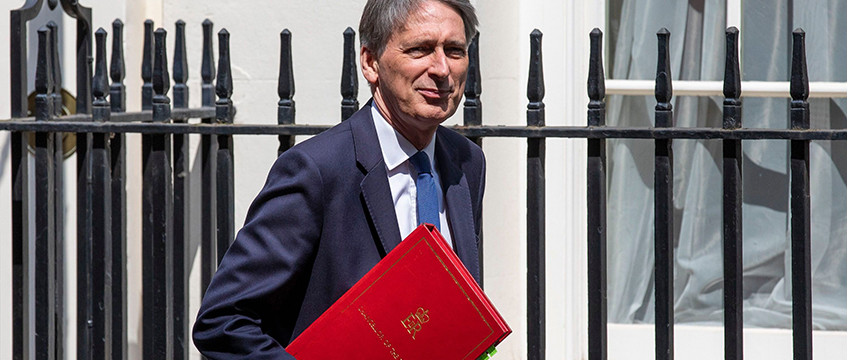£3bn affordable homes ‘guarantee’ unveiled in Spring Statement
Chancellor Philip Hammond has announced a new £3bn “Affordable Homes Guarantee scheme” during the Spring Statement today (13 March).
The scheme aims to support the delivery of around 30,000 affordable homes by guaranteeing up to £3bn of borrowing by housing associations in England.
Hammond also pledged £717m from the £5.5bn Housing Infrastructure Fund to unlock up to 37,000 new homes in West London, Cheshire, Didcot and Cambridge.
Chancellor Philip Hammond has announced a new £3bn “Affordable Homes Guarantee scheme” during the Spring Statement today (13 March).
The scheme aims to support the delivery of around 30,000 affordable homes by guaranteeing up to £3bn of borrowing by housing associations in England.
Hammond also pledged £717m from the £5.5bn Housing Infrastructure Fund to unlock up to 37,000 new homes in West London, Cheshire, Didcot and Cambridge.
Sites at the latter two areas form a key part of Hammond’s new strategy involving the “Oxford-Cambridge arc”, Hammond said at the House of Commons.
Growth within this part of England will also include £445m from the fund to create more than 22,000 homes.
Additionally, Hammond pledged up to £260m for the Borderlands Growth Deal, bringing total government funding into the Borderlands area so far to £362m.
Playing catch-up
While the housing initiatives were broadly welcomed by the industry, many said that more needed to be done to tackle the issue.
Jan Crosby, UK head of housing at KPMG, noted: “The chancellor did nod towards the progress made – which is promising – but we must not forget that we are playing catch-up and are nowhere near the aspiration to build 300,000 new homes each year.”
He added that while the £3bn affordable homes guarantee is the “dazzling takeaway” from the statement, it must not feed into any form of house price inflation.
Crosby said: “Whilst £3bn is a substantial sum and more investment is certainly welcome, we have to ensure that this doesn’t feed into any form of house price inflation – coordinated action is what’s needed here.
“Such coordination around place-making has been evident in recent announcements, with noise around consultation on infrastructure finance and planning getting more of a review, but in my mind it is innovation that is lacking. Thinking of alternatives – like an employer-backed nomination scheme, for example – is what will finally ensure the UK gets our housing problem under control.”
Patrick Gower, residential research associate at Knight Frank, said: “The funding is welcome, because the government must look to a diverse range of housing providers if its ambitious target of 300,000 additional homes every year is to be met.
“This means looking not just to the volume housebuilders, who provide a significant amount of the country’s housing supply already, but also to affordable housing providers and developers of alternative tenures, such as build to rent, student housing and senior living.”
Overshadowed by Brexit
Otherwise, the Spring Statement was unsurprisingly meagre on significant measures for the industry, as prime minister Theresa May continues her efforts to reach an agreement with parliament on an exit from the EU.
Ahead of today’s vote – the second of three potential votes on Brexit – Hammond emphasised that “leaving with ‘no deal’ would mean significant disruption in the short and medium term, and a smaller, less prosperous economy in the long term, than if we leave with a deal”, leading to higher unemployment, lower wages and higher prices in shops.
“A no-deal Brexit would deliver a significant short- to medium-term reduction in the productive capacity of the British economy,” he said.
However, Hammond downplayed the impact that market uncertainty has so far had on the British economy: “The economy itself is remarkably robust. It has grown for nine consecutive years, with the longest unbroken quarterly growth run of any G7 economy, and is forecast to continue growing in each of the next five years.”
The OBR has forecasted 1.2% GDP growth in Britain in 2019, followed by 1.4% next year and 1.6% in each of the three years leading to 2023.
Retail ignored
Meanwhile, figures in the retail property industry have been quick to express their disappointment that potential measures to help retailers were not addressed.
Robert Hayton, head of UK business rates at real estate adviser Altus Group, said: “The Spring Statement has been totally overwhelmed by Brexit, with the chancellor missing a golden opportunity to help those major retail and hospitality businesses who are reducing their estates and headcount, as well as manufacturers and the services industries hurting from the current uncertainties – all of whom now face the highest standard tax rate since 1990 at over 50% on 1 April.”
Helen Dickinson, chief executive of the British Retail Consortium, added: “It is disappointing that the Spring Statement does nothing to support struggling high streets at a time when they are weighed down by the twin burdens of skyrocketing business rates and Brexit uncertainty.”
To send feedback, e-mail pui-guan.man@egi.co.uk or tweet @PuiGuanM or @estatesgazette











